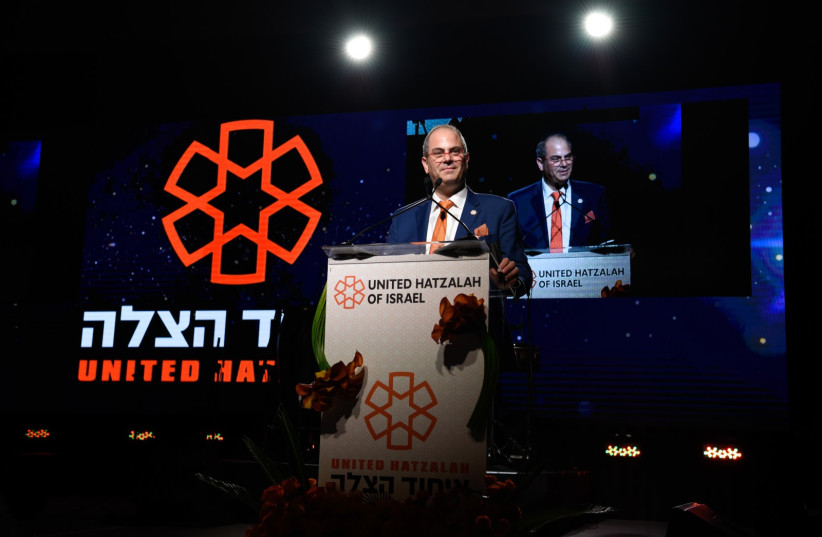Impatience, the inability to sit still in class, chutzpah and sometimes bending the rules are considered by most people to be negative qualities. But from the age of five, when he witnessed a deadly terrorist attack in his Orthodox Jerusalem neighborhood opposite Mount Herzl, Eli Beer turned these qualities into a dauntless mission to save lives in Israel and even around the world.
The 49-year-old father of five and now a grandfather is the founder and president of United Hatzalah, who inspired thousands of volunteers to provide free emergency medical service to anyone who needs it in Israel. Based in Jerusalem, United Hatzalah has won the enthusiastic support of kings, princes, presidents, prime ministers, physicians, scientists, eminent rabbis, politicians and ordinary people. It has even served as a model for places like Dubai, Japan and several US states.
Unlike ambulance services around the world, most of the trained medics and paramedics reach those who need help on well-equipped ambucycles that quickly maneuver through traffic, arriving before ordinary ambulances. Volunteers drop everything, even on holy days, in any weather and at any hour, to save people.
Who is United Hatzalah founder Eli Beer?
Coming from a haredi family, the son of an American-born bookseller and real estate man, Beer developed a keen business sense but was regarded as the black sheep of the family for not becoming a Torah scholar. But when he saw an elderly man near his home being hit by a car, blood gushing from his neck, he grabbed his kippah and shoved it into the wound, saving the man’s life. Having spent many hours visiting the nearby Yad Vashem Holocaust Remembrance Center instead of going to yeshiva classes, and noticing the number on the man’s arm, Beer vowed to somehow “save six million lives.”
He has personally rescued countless people from death (even his own father) and delivered hundreds of babies; over the years, United Hatzalah has indeed treated more than six million people – Jews, Arabs, Christians, Druze, secular, National-Religious, haredim, men, women and children. And Beer’s own wife, Gitty, and their five adult children joined the effort by becoming skilled in medical rescue and also providing psychological help to the traumatized.

At 16, after taking a basic first-aid course at Magen David Adom, he made the rounds on an ambulance but was allowed only to make out bills and was not saving anyone. He noted with frustration that the vehicles often arrived too late because of traffic, and the medics couldn’t find the victim. More volunteers could reach the scene without an ambulance if they had a pager device, he thought, but MDA was unwilling to hear of it.
On the excuse of visiting cousins in Brooklyn, Beer persuaded his family to give him an airline ticket. Nearly killed by muggers on the subway, he escaped and ended up at Radio Shack, where he bought two radio scanners for $700 apiece so friends in Jerusalem could intercept MDA alerts. Looking innocent on the customs line, he managed to smuggle in the devices which were approved for use in Israel, grateful for the “miracle.”
Over the next few decades, Beer consolidated United Hatzalah as an Israeli rescue organization that never charges for its emergency services, and he went abroad for many months a year to court wealthy donors (including at the World Economic Forum at Davos). He coordinated rescues at Jerusalem’s Versailles wedding hall collapse and the terrorist bombing of Café Hillel, where his mentor, Dr. David Applebaum, and his daughter Nava were among the seven murdered and over 50 wounded. Beer even ran to save a choking toddler after having slipped on ice and broken his foot, suffering excruciating pain.
When on a fundraising trip in Miami, he suddenly felt unwell. It turned out that he had caught COVID-19 and developed life-threatening symptoms. He had a 5% chance of survival, went into a coma, was put on a ventilator for 28 days and finally woke up with delusions, paranoia and thoughts of retiring.
But when he heard that Ibrahim, a Muslim volunteer for United Hatzalah, had rushed to bring candles to a 94-year-old Holocaust survivor in Bat Yam who begged to light them for Passover, sat and ate with her and listened to her stories, Beer felt rejuvenated and was ready to fly home.
Nachman Seltzer’s book tells an extraordinary story about a dedicated Jew obsessed with saving lives and the team of thousands whom he inspired to join the cause. All of the photos are, unfortunately, in black and white rather than color. There is no index at the back, which makes it difficult to search for names and subjects. The numerous tales about how Beer persuaded people to donate funds and equipment are a bit tiresome, sometimes giving the feeling that they were mentioned to recompense the contributors.
But these minor complaints are greatly overshadowed by the uphill story of United Hatzalah, the tragedies and successes and Beer’s almost unbelievable adventures.
90 Seconds
By Rabbi Nachman Seltzer
Shaar Press
469 pages; $29.99
